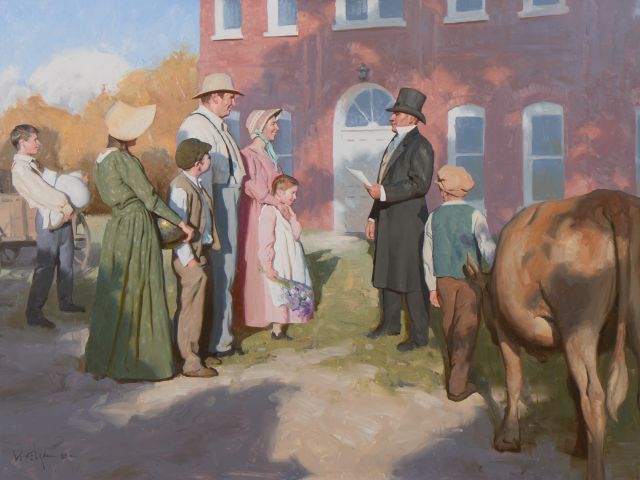To accompany your Come Follow Me study for May 26 to June 1
In addition to reading these seven sections this week, you will also want to:
- Read Chapter 20: Doctrine and Covenants 51–56 (churchofjesuschrist.org)
- Read Chapter 21: Doctrine and Covenants 57–58 (churchofjesuschrist.org)
- Read Joseph Smith’s Revelations, Doctrine and Covenants 51 (churchofjesuschrist.org)
- Read Joseph Smith’s Revelations, Doctrine and Covenants 52 (churchofjesuschrist.org)
- Read Joseph Smith’s Revelations, Doctrine and Covenants 53 (churchofjesuschrist.org)
- Read Joseph Smith’s Revelations, Doctrine and Covenants 54 (churchofjesuschrist.org)
- Read Joseph Smith’s Revelations, Doctrine and Covenants 55 (churchofjesuschrist.org)
- Read Joseph Smith’s Revelations, Doctrine and Covenants 56 (churchofjesuschrist.org)
- Read Joseph Smith’s Revelations, Doctrine and Covenants 57 (churchofjesuschrist.org)
- Read Saints, 1:125–128 at https://www.churchofjesuschrist.org/study/history/saints-v1/12-after-much-tribulation?lang=eng
- Read “The Center Place,” Revelations in Context, at https://www.churchofjesuschrist.org/study/manual/revelations-in-context/the-center-place?lang=eng
- Read The Journey of the Colesville Branch (churchofjesuschrist.org)
- Read ‘A Bishop unto the Church’ (churchofjesuschrist.org)
- Review any or all of the following videos:
If you would like a Kahoot game on this material that you could use with your family or class, click here: https://create.kahoot.it/share/doctrine-and-covenants-51-57/dcd1a672-f5cf-47e7-92af-4ebba24751d6. To use it with a group, after clicking on this link, you will need to log into Kahoot, creating a free account if you have not done so previously, then click on the blue “Host Live” button or the gray “Assign” button, depending on how you wish to use the Kahoot. Some of the Kahoot questions may presuppose that the player has read through the suggested answers to the following Points to Ponder and at least has browsed the Institute student manual as well.
Points to Ponder in Doctrine and Covenants 51-57
1. In what sense were people intended to be “equal” under the law of consecration? How would a grant of $100,000 to every family not be treating them equally in this sense?
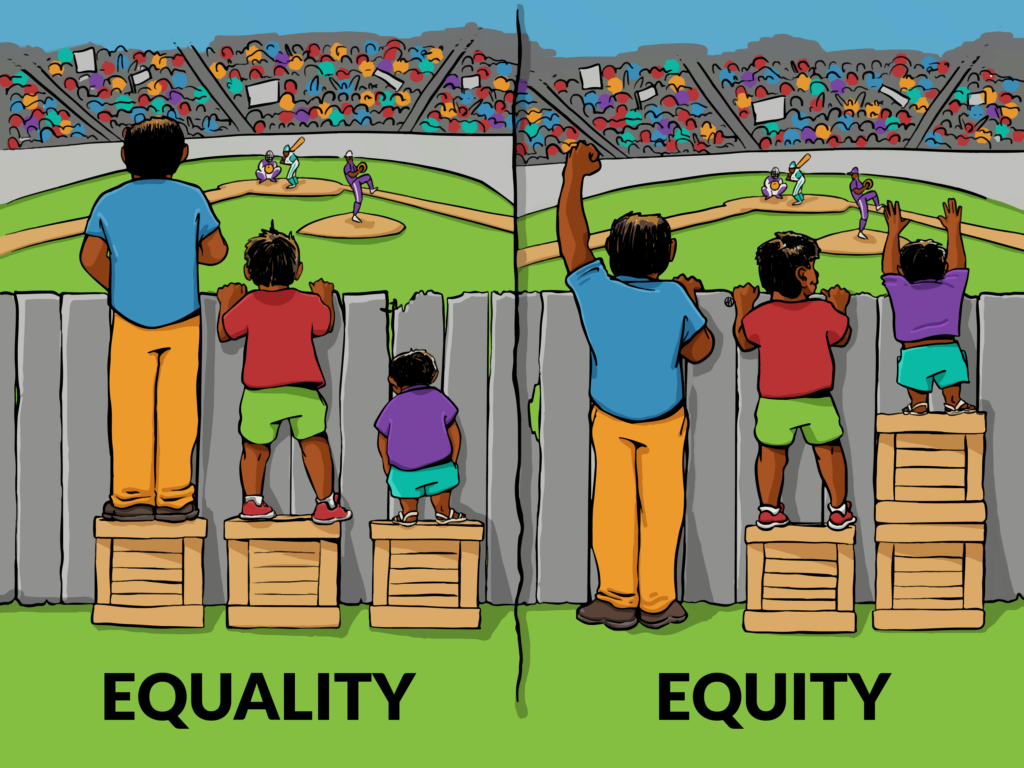
2. What word in 51:3 has had a significant evolution in meaning since 1831? What difference does that make to our understanding of what the Lord intended?

3. How does the Lord’s disclosure of the location for the city of Zion exemplify how He reveals things to His people “line upon line”? What additional lessons do we learn from how He did it?
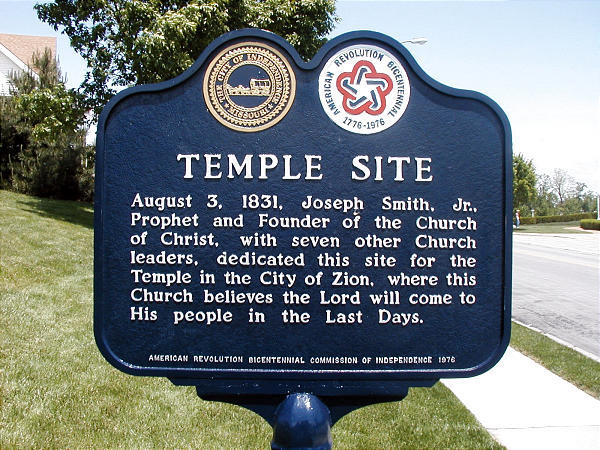
4. If someone chose to leave or was expelled from the Church after beginning to live the law of consecration, what, according to D&C 51, could he take with him? What could he not? Why?
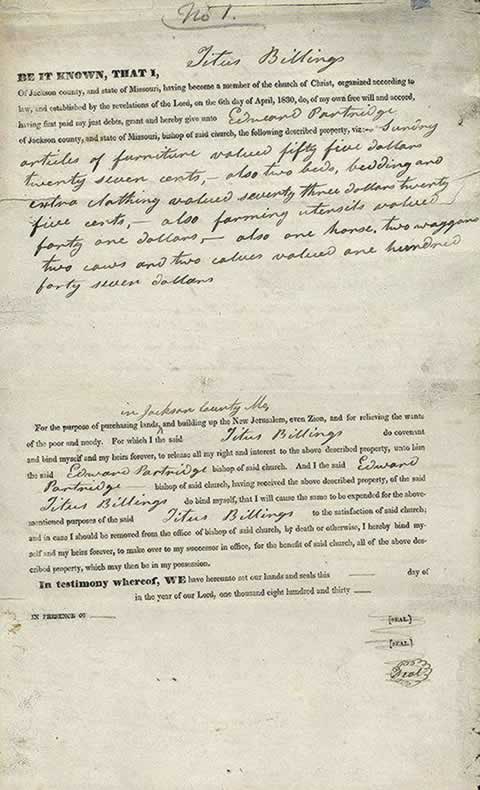
5. Why would the Lord consider it necessary to clarify in 51:10 that Latter-day Saint property “not be taken and given unto that of another church”? Was there a movement afoot to be extra generous with the Baptists or Catholics, necessitating the Lord’s intervention?
6. What useful principle that we could apply today is found in the Lord’s instructions in 51:17 to “act upon this land as for years”? Can you give an example?
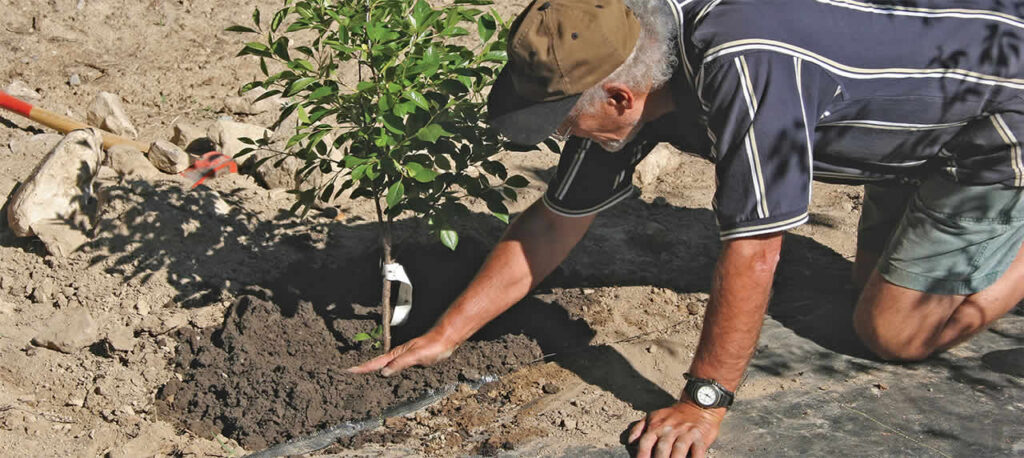
7. How applicable are the missionary instructions in 52:9-10, 36 to missionaries today?
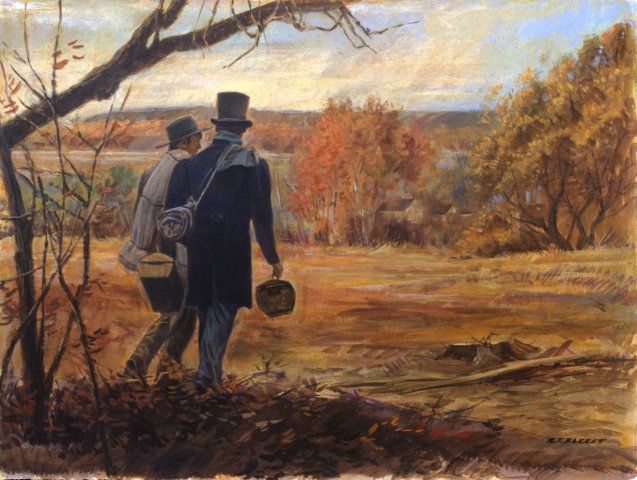
8. How many different reasons can you think of for why the Lord would instruct missionaries to go two by two rather than let them split up and double the number of people they could teach?
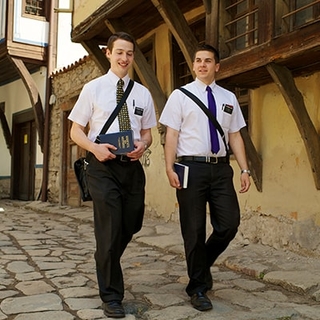
9. What additional keys does D&C 52 give beyond those revealed in D&C 50 concerning how to distinguish true spiritual manifestations from false ones?

10. What do we know about Simonds Ryder’s reaction to the reference to him in 52:37?
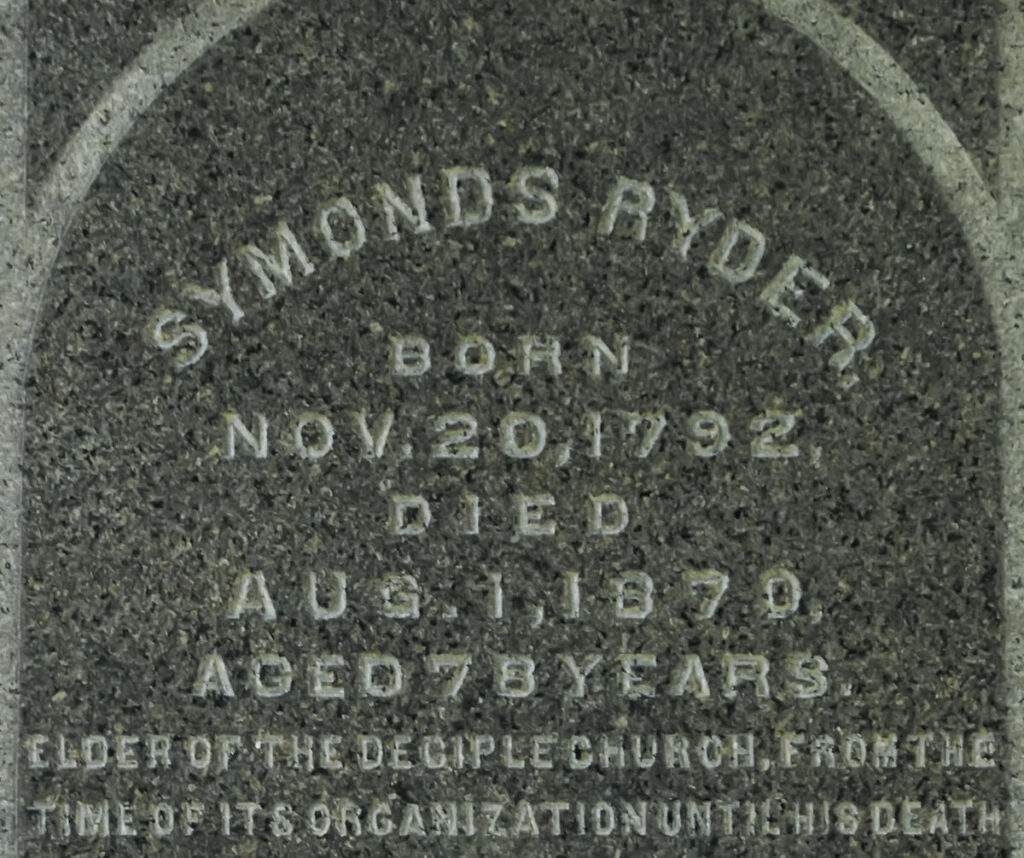
11. What passage in D&C 54 could you quote to someone who always came to sacrament meeting late? What did the Lord really mean to teach in that verse?

12. What change in punctuation of D&C 56:16-17 might make those verses more literally what the Lord intended to say?
13. Though the Lord chastises some among both the rich and the poor in 56:16-17, what does He say to suggest which group He in general considers to be better off spiritually?

14. What clues can you find in the heading to section 57 as to why this section was given when it was given?
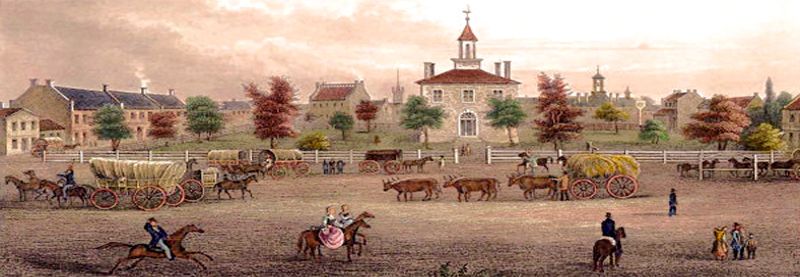
15. Why does the Lord emphasize “equality” (D&C 51:3, 9) in temporal matters, and how can we apply this principle today?
16. How does the counsel to “deal honestly” (D&C 51:9) in business dealings relate to our spiritual lives?
17. The Lord calls some to “forsake the world” (D&C 53:2). What does this mean for us in a modern context?
18. Why were William W. Phelps and Oliver Cowdery instructed to be involved in printing for the Church? (D&C 55:4)? How does this relate to sharing truth today?
19. The Lord designates Missouri as the “land of promise” (D&C 57:1-2). What can we learn about divine guidance and patience when promised blessings seem delayed?
20. What other passages in these sections did you find especially inspiring?
Possible Answers to Points to Ponder in Doctrine and Covenants 51-57
1. In what sense were people intended to be “equal” under the law of consecration? How would a grant of $100,000 to every family not be treating them equally in this sense?
The intended equality was to be based on their “circumstances, wants, and needs.” (51:3). A family with eight children would obviously have needs different from a retired couple with none, for instance.
2. What word in 51:3 has had a significant evolution in meaning since 1831? What difference does that make to our understanding of what the Lord intended?
The 1828 Webster’s Dictionary defined the word “want” as follows:
WANT, noun
- Deficiency; defect; the absence of that which is necessary or useful; as a want of power or knowledge for any purpose; want of food and clothing. The want of money is a common want 2 Corinthians 8:14, 9.
From having wishes in consequence of our wants, we often feel wants in consequence of our wishes.
2. Need; necessity; the effect of deficiency.
In other words, it was not in those days a synonym for “desire” but was a synonym for “need.” The Lord didn’t intend to say in 51:3 that stewardships were to be allocated on the basis of whatever a member or family might desire or wish they could have. It was to be based on what they actually lacked.
3. How does the Lord’s disclosure of the location for the city of Zion exemplify how He reveals things to His people “line upon line”? What additional lessons do we learn from how He did it?
Steps along the way to specifying the location for the city included the following:
- 3 Nephi 21:22-24: Converted Gentiles would be adopted into the House of Israel and assist the remnant of Jacob to build a city to be called the New Jerusalem and then gather the Lord’s people into it.
- Ether 13:2-11: Ether spoke of a New Jerusalem to be built upon “this land.”
- Moses 7:62: The Lord told Enoch that in the latter days He would gather His people to a holy city to be called Zion, or the New Jerusalem.
- D&C 28:9: It was not yet revealed where the city of Zion would be built, but it would be “on the borders by the Lamanites.”
- D&C 42:8-9: The Lord hints in a revelation given in Kirtland, Ohio, that the place for the city of the New Jerusalem to which the saints would gather would be in the “regions westward.”
- D&C 45:66-71: The Lord gives much exciting detail about the future glory of Zion, but no specific geography.
- D&C 48:4: The Lord emphasizes the need to save money to buy land for the city.
- D&C 52:42-43: The saints’ land of inheritance would be in “the land of Missouri,” where the Lord promised to “hasten the city in its time.”
- D&C 57:1-3: The Lord finally specifies that the place for the city of Zion was in Independence, Missouri, and the spot for the temple was on a lot not far from the courthouse.
It seems significant that not until the saints were actually in the location for the future city did the Lord reveal that was the place. Similarly, He will seldom reveal to us which course of study we should pursue in college until we have looked in some detail at the options. Nor is He likely to reveal that we have found the right future spouse until we have become acquainted with him or her and had a variety of experiences together.
4. If someone chose to leave or was expelled from the Church after beginning to live the law of consecration, what, according to D&C 51, could he take with him? What could he not? Why?
Everything was to be handled according to the laws of the land. Consecrations were legally deeded over to the Church, and stewardships were legally deeded back. Thus, a participant who changed his mind had a legal (not necessarily moral) right to keep his stewardship, but he had no legal right to reclaim his original consecration.
5. Why would the Lord consider it necessary to clarify in 51:10 that Latter-day Saint property “not be taken and given unto that of another church”? Was there a movement afoot to be extra generous with the Baptists or Catholics, necessitating the Lord’s intervention?
The implementation of the law of consecration was to be decentralized. The word “church” here means “ward,” “branch,” or “stake.” For example, those in Missouri did not have to ship their excess up to the saints in Kirtland, or vice-versa. It has no reference to another denomination.
6. What useful principle that we could apply today is found in the Lord’s instructions in 51:17 to “act upon this land as for years”? Can you give an example?
Some early saints in Kirtland could have felt there was no need to put down roots there or work to improve their property or their community since they would shortly be leaving for “Zion” somewhere in the west. The Lord, however, instructed them to act as though they would be there indefinitely, and it would turn out to be for their good. Possible applications in our lives could include:
- Getting fully involved in the ward and getting to know the other members, even though we know we’re in that ward only for a year or two.
- Being a good neighbor and community participant even though we plan to move in the spring.
- Doing our best in our ward calling, even though we happen know that we’ve served for enough years that we’re due for a release.
7. How applicable are the missionary instructions in 52:9-10, 36 to missionaries today?
The instruction to base our teachings on what the apostles and prophets have said or written is still applicable, as is the instruction to teach with the Spirit and to go two by two. If a missionary isn’t positive that he can say “I know the gospel is true,” it is acceptable to teach what he “most assuredly believes.” [We would hope he would work on increasing his testimony, however.] Additionally, missionaries today have such tools as Preach My Gospel and social media which those in 1831 did not have. And confirmation of new converts is seldom done today “by the water’s side” but is reserved for a public sacrament meeting.
8. How many different reasons can you think of for why the Lord would instruct missionaries to go two by two rather than let them split up and double the number of people they could teach?
Reasons would include:
- For the physical, spiritual, emotional, and legal safety of the missionaries. E.g.,
- Enemies are less likely to attack or subdue two missionaries than one who is alone.
- A missionary is less likely to fall prey to temptation with a companion around.
- Companions can encourage and uplift each other in times of loneliness, homesickness, or discouragement.
- A companion can provide needed testimony against those who would maliciously and falsely accuse another missionary of wrongdoing.
- So that the stronger or more experienced companion can strengthen the weaker or newer one.
- So that two can bear witness of the same truths, thereby increasing their effectiveness.
9. What additional keys does D&C 52 give beyond those revealed in D&C 50 concerning how to distinguish true spiritual manifestations from false ones?
Those operating with the Lord’s Spirit will:
- Have a contrite spirit (52:15, 16)
- Use meek language (52:16)
- Obey the ordinances. (52:15-16). In other words, one pretending to perform healings or other miracles in the name of the Lord but who refuses to accept baptism and confirmation could be recognized as an imposter.
10. What do we know about Simonds Ryder’s reaction to the reference to him in 52:37?
Ryder was evidently offended that his name was misspelled “Rider” in the original version and perhaps also took exception to the fact his first name was spelled “Simonds” (and still is in the D&C!) rather than “Symonds,” and decided that if the Lord were really speaking to Joseph Smith, he should have been able to spell his name correctly! He apostatized and later led the mob which tarred and feathered the Prophet and Sidney Rigdon the following March.
11. What passage in D&C 54 could you quote to someone who always came to sacrament meeting late? What did the Lord really mean to teach in that verse?
54:10: “They who have sought me early shall find rest to their souls.” While we might with a smile point that out to those habitually tardy in their attendance, the Lord is really teaching the blessings attendant to our being prompt to accept the gospel when opportunity presents itself. The Colesville saints, now temporarily residing in Thompson, Ohio, were among the first to accept the gospel in this dispensation, and the Lord is honoring them as such.
Similarly, there are much greater blessings promised for those who accept the gospel quickly, in this life, than for those who postponed it until death and “afterwards received it,” whose destiny appears to be the terrestrial, not the celestial, kingdom. (D&C 76:74)
12. What change in punctuation of D&C 56:16-17 might make those verses more literally what the Lord intended to say?
Elimination of the first comma in each verse would make it clearer that not all rich or all poor men were under condemnation, only those who were selfish or greedy.
13. Though the Lord chastises some among both the rich and the poor in 56:16-17, what does He say to suggest which group He in general considers to be better off spiritually?
He goes on to offer great promises to “the poor who are pure in heart” in 56:18 and promises in 56:19 that “the poor shall rejoice” at the day of His coming. No doubt there will be some among the rich who will, too, but it was a rich man, not a poor man, that Jesus told his Old World disciples would find it harder to enter the kingdom of God than for a camel to pass through the eye of a needle.
14. What clues can you find in the heading to section 57 as to why this section was given when it was given?
The Prophet was (1) pondering (“contemplating”) the subject, (2) was evidently praying for answers, and (3) was now in Missouri, where the Lord could confirm a location for the city of Zion that the Prophet was actually acquainted with, in keeping with the spirit of D&C 9:7-9.
15. Why does the Lord emphasize “equality” (D&C 51:3, 9) in temporal matters, and how can we apply this principle today?
The Lord desires unity and fairness among His people, ensuring no one is in want while others have excess (see also D&C 82:17-18). Today, we can apply this by:
- Practicing generosity and avoiding materialism.
- Supporting Church welfare and humanitarian efforts.
- Seeking ways to help those in need within our communities.
16. How does the counsel to “deal honestly” (D&C 51:9) in business dealings relate to our spiritual lives?
Honesty in temporal affairs reflects integrity, a celestial attribute. When we are truthful in small things, we prepare ourselves for greater spiritual responsibilities (see Luke 16:10).
17. The Lord calls some to “forsake the world” (D&C 53:2). What does this mean for us in a modern context?
It means prioritizing God’s will over worldly trends by such means as:
- Avoiding harmful media and addictive behaviors.
- Keeping the Sabbath day holy despite societal pressures.
- Living modestly rather than seeking excessive wealth or status.
18. Why were William W. Phelps and Oliver Cowdery instructed to be involved in printing for the Church? (D&C 55:4)? How does this relate to sharing truth today?
Printing was vital for spreading revelations. Today, we can:
- Share uplifting messages on social media.
- Study and distribute Church publications.
- Use our skills (writing, art, technology) to build the kingdom.
19. The Lord designates Missouri as the “land of promise” (D&C 57:1-2). What can we learn about divine guidance and patience when promised blessings seem delayed?
Some blessings (like Zion’s full establishment) are long-term. We can:
- Trust God’s timing while doing our part now. We don’t need to worry about any supposed lack of progress in the building of the New Jerusalem, as the Lord “will hasten the city in its time.” (52:43)
- Build “spiritual Zion” in our hearts through obedience.
- Prepare for future revelations about Zion’s return.
20. What other passages in these sections did you find especially inspiring?
My list would include:
- 52:40: If we don’t remember the poor, needy, sick, and afflicted, we are not true disciples.
- 55:4: The Lord has been concerned about education since the earliest days of the Church.
- 56:14: If we seek to counsel in our own ways rather than accept the Lord’s counsel, our sins may not be pardoned.
